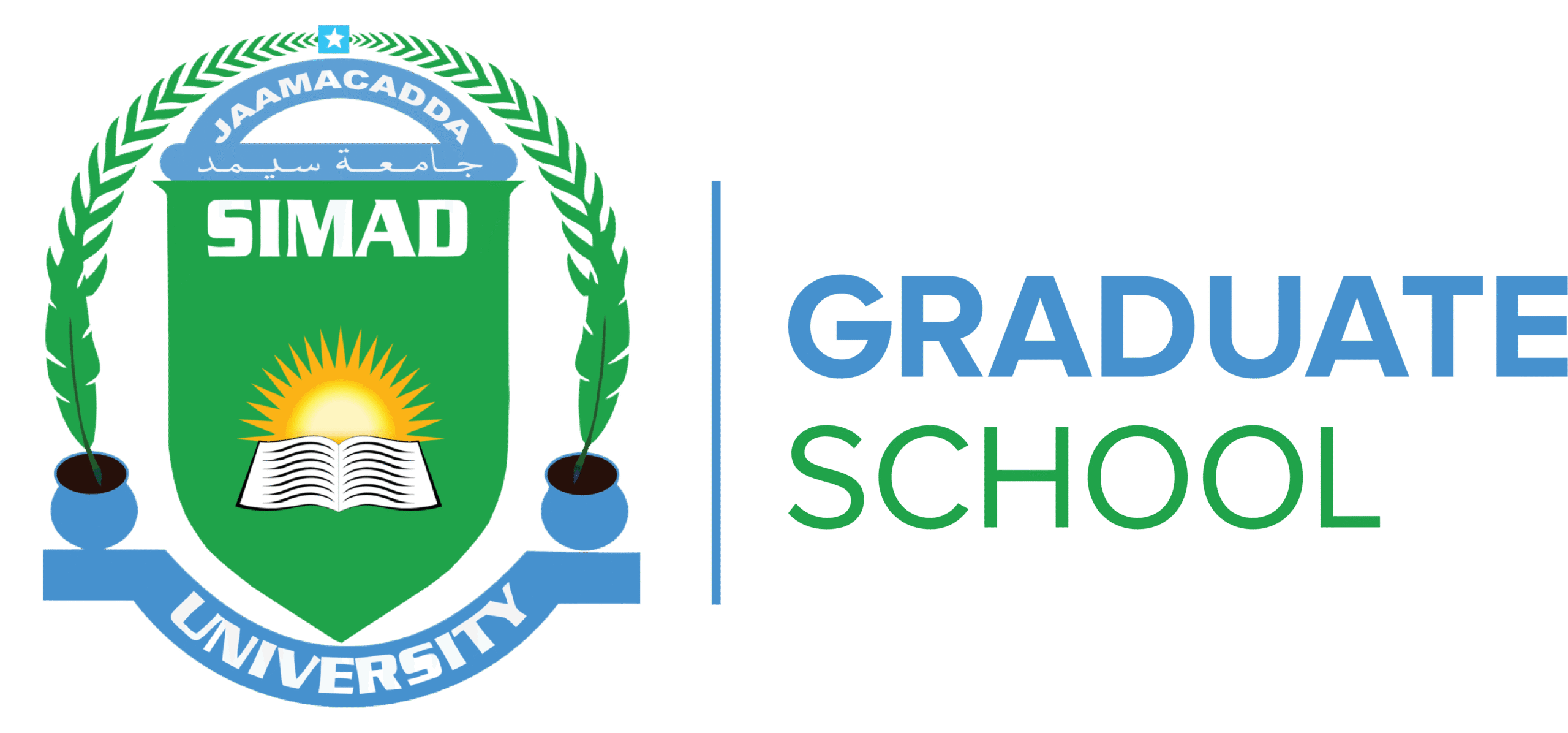Home
Programs
Master Of Business Administration
Master Of Business Administration
The Master of Business Administration (MBA) at SIMAD University prepares high-potential professionals for leadership roles across private, public, and non-profit sectors. The program responds to Somalia’s growing demand for strategic managers and entrepreneurial leaders by integrating advanced coursework with research and applied projects.

Introduction
The Master of Business Administration (MBA) at SIMAD University prepares high-potential professionals for leadership roles across private, public, and non-profit sectors. The program responds to Somalia’s growing demand for strategic managers and entrepreneurial leaders by integrating advanced coursework with research and applied projects. It offers four specializations in Marketing, Finance, Human Resources, and Entrepreneurship & Innovation so learners can tailor study to career goals while building a rigorous general-management core. The curriculum blends global best practice with Somali and East-African business realities and is delivered through lectures, case studies, team projects, seminars, guest talks, and experiential learning, with options for in-person and blended delivery.
The program is structured for maximum of two academic years (total 60 credit hours) and is designed to align progressively with recognized accreditation expectations (AACSB/AMBA/ACBSP), emphasizing quality assurance, teaching excellence, and strong student outcomes.
Specific Objectives
Graduates will be able to:
- Integrate economics, accounting/finance, marketing, operations, and strategy to solve complex business problems.
- Lead ethically and manage change, culture, and teams across diverse contexts.
- Conduct and apply research (problem framing, methodology, data collection/analysis, and reporting) to inform managerial decisions.
- Formulate and implement strategies that deliver competitive advantage.
- Create, evaluate, and scale new ventures and innovation initiatives.
- Communicate persuasively in writing and presentations to multiple stakeholders.
Human Resources and Facilities
Instruction is delivered by qualified, research-active faculty (PhD strong professional backgrounds considered for practice-oriented teaching), with English-medium instruction and ongoing pedagogical development. Supervision standards ensure quality and consistency across research and capstone work. Learning resources include monitored access to teaching materials, digital tools, and databases; quality assurance covers curriculum review, course evaluations, lecturer development, assessment moderation, graduate tracer studies, and employer feedback to keep the program industry relevant.
Exam Regulations
Assessment emphasizes both continuous learning and summative evaluation. Typical components and indicative weight ranges include participation (5–10%), assignments (15–20%), group projects/presentations (15–25%), case analyses (10–15%), and final examinations (20–30%). The capstone/research component is assessed independently (100% of its 6 credits). Many course outlines specify that students must pass both midterm/continuous assessment and the final exam to pass the course (commonly 60% coursework, 40% final). Progression follows successful completion of semester requirements and maintenance of satisfactory standing per university policy.
Award of the Degree
To be awarded the Master of Business Administration, a candidate must:
- Complete core, specialization, electives, and thesis with the minimum GPA required.
- Satisfy ethical and research compliance requirements.
- Demonstrate English proficiency (B2 via Linguaskill or approved IELTS/TOEFL).
- Clear all financial and administrative obligations.
The Master of Business Administration (MBA) at SIMAD University prepares high-potential professionals for leadership roles across private, public, and non-profit sectors. The program responds to Somalia’s growing demand for strategic managers and entrepreneurial leaders by integrating advanced coursework with research and applied projects. It offers four specializations in Marketing, Finance, Human Resources, and Entrepreneurship & Innovation so learners can tailor study to career goals while building a rigorous general-management core. The curriculum blends global best practice with Somali and East-African business realities and is delivered through lectures, case studies, team projects, seminars, guest talks, and experiential learning, with options for in-person and blended delivery.
Study Programs (Structure & Credits)
Course Name | CU |
Managerial Economics & Policy Analysis | 3 |
Organization and Business Management | 3 |
Operation Management | 3 |
Investment and Portfolio Management | 3 |
Corporate Finance | 3 |
Risk and Financial Analysis | 3 |
Strategic Management | 3 |
Managerial Finance | 3 |
Research Methods for Business | 3 |
New Venture Creation | 3 |
Data Analysis and Interpretation | 3 |
Data Science and IA for leaders | 3 |
Business Law and Ethics | 3 |
Electives from Specialization |
|
Marketing |
|
Digital Marketing | 3 |
Consumer Behavior | 3 |
Brand Strategy | 3 |
Finance |
|
Investment and Portfolio Management | 3 |
Corporate Finance | 3 |
Risk and Financial Analysis | 3 |
Human Resources |
|
Talent Management | 3 |
Strategic HR Planning | 3 |
HR Analytics | 3 |
Human Resources | 3 |
Entrepreneurship and Innovation |
|
Entrepreneurial Finance | 3 |
Innovation Strategy | 3 |
Business Model Innovation | 3 |
Applicants must:
- Hold a recognized bachelor’s degree in business, economics, or a related field (minimum GPA 2.5).
- Provide evidence of professional experience (preferred but not mandatory).
- Semester Fees: USD 475
- Tuition Fees: USD 2,850 for two years
- The school has three intakes
- January, May, September
